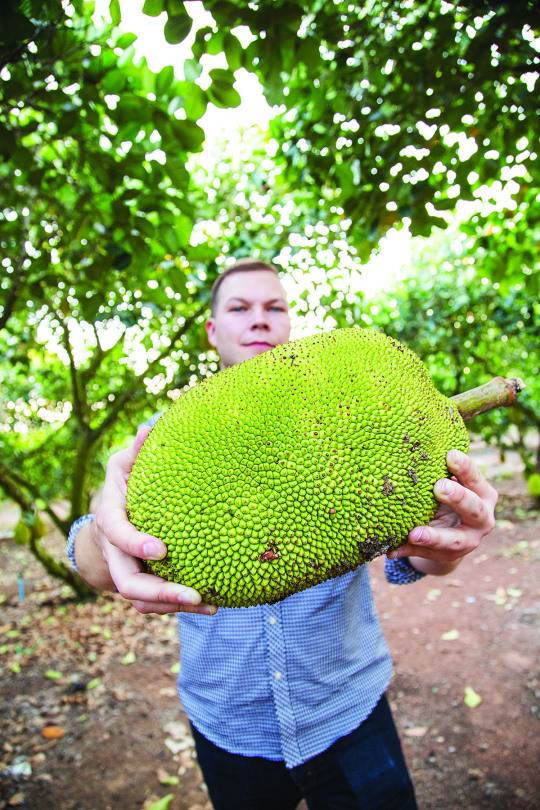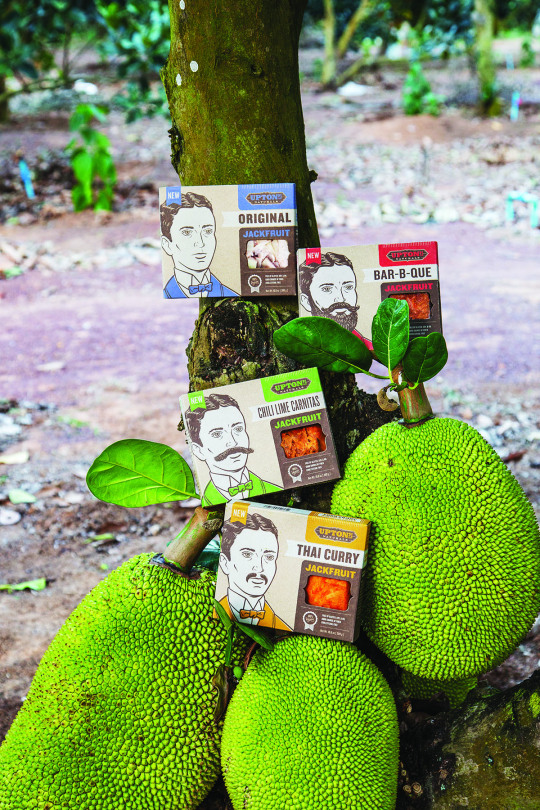
There are lots of reasons for
being a vegan. Maybe it makes your body feel better. Or perhaps you don’t
approve of killing and eating fellow Earth-creatures.
But vegan or not, sometimes a
guy just has to have a “burger.” Or a slice of “bacon.” Or
some “BBQ.” Meat substitutes have been around forever, but, well, most
of them are still “substitutes.”
Pulled
Pork, Shredded Chicken
Meet the Jackfruit. Native
to Southeast Asia, a mature jackfruit can weigh close to 100 pounds; it is, in
fact, the world’s largest fruit. Cut through its spiky exterior and you’ll find
a mild-flavored, nutrient-dense, plant-based substance that makes a perfectly
convincing meat substitute. According to Upton’s Naturals, the first company
to make pre-seasoned, heat-and-serve, natural jackfruit available in the U.S.
market, when it’s cooked up young and seasoned properly, this tropical fruit
has the delectable texture and taste of pulled pork or shredded chicken.
Jackfruit is just the latest breakthrough product
from Upton’s Naturals. Based in Chicago, Upton’s Naturals is an
independently-owned natural foods company that focuses on meat alternatives and
vegan values.
Starting in 2006, Dan Staackmann, the company’s
founder, began using flavored, wheat-based seitan to prepare a line of products
that’s sold in stores across the country. Stores like Whole Foods.
Currently, Staackmann is launching the first-to-market, seasoned and
ready-to-eat jackfruit products in the United States.
The Weirdo
Staackmann
has been a vegan since he was 15. “I
grew up on your standard American diet,” he explains. “Pepperoni
pizza, and half gallons of ice cream served for dessert. Then, when I was 15, I
just had a wake-up call and knew that was not for me. Really, it shouldn’t be
for anybody.”
Staackmann
became a vegan to respect animal rights and
environmental issues more than for health reasons. For the first 15 years he
was an outcast. “You’re the weirdo,” he laughs. “You’re the one
who goes to family dinners and gets picked on…”
Nonetheless, Staackmann stuck to his
guns. He started an organic horticulture
business, but it didn’t work out. He paid the bills by buying and selling
high-design furniture via auction.
More Tooth. More Chew
Meanwhile, Staackmann found
himself becoming increasingly passionate about veganism, and he wanted to do something
in food. Seitan [pronounced say-tan,
or sigh-tan] was one of his favorite
meat substitutes, but at the time there were no local producers in Chicago. In
fact the only place you could get it was at restaurants, where the line cooks made
it themselves. Staackmann saw a business opportunity that fit perfectly with
his vegan values.
Most meat-analogues are made
from soy. Tempeh is fermented soy. Tofu is coagulated soy milk. Seitan, on the
other hand, is made by rinsing all the starch out of wheat flour, so what you
have left is quite meat-like in texture. “Sometimes seitan can be a little
spongy,” says Staackmann. “Ours is firm, with a little more ‘tooth’
and ‘chew.’” Also, compared to soy products, seitan is not highly
processed.
“It’s got a neutral
flavor,” Staackmann explains. “We make traditional seitan, flavored
with garlic and soy sauce, but we also have five other flavors that are quite
unique. We’ve got bacon. We’ve got chorizo you can use for tacos or nachos.
We’ve got Italian, which is like Italian sausage and goes great in pizza or
pasta.”
According to Staackmann you
can use seitan in any recipe that calls for meat. “It’s like chicken
chunks. You can put it in stir fries. Salads. Wraps.”
Whole Foods Was Easy
Staackmann
steered clear of retail marketing while he built the business; he sold his seitan
directly to a handful of Chicago restaurants. People loved it! So he saved up some
money, opened a home equity line of credit (back when it was probably too easy
to do that) and bought some retail packaging equipment.
As
it turns out, getting the packaged Naturals into Whole Foods was easy.
“I just walked into
the store,” Staackmann remembers. “I knew there was one grocery buyer
who was a vegan, so I said, ‘I’ve got this product we’ve been selling to
restaurants, and would you be interested?’ And he said, ‘Of course!’”
Whole Foods gave Staackmann
a shot in seven Chicago stores. Then he hooked up with a local distributor that
serviced 20 Whole Foods stores in the greater Chicago area. Once Whole Foods
saw that sales of Upton’s products were doing well, they offered him shelf
space across the entire region, which at the time was 40 stores.
“In every market,”
says Staackmann, “you need an anchor like Whole Foods to activate the
distribution, because no distributor is gonna take your product unless they’ve
got at least ten, 20 stores they know they can sell it to. And that’s pretty
much how we did it, step by step, region by region.”
Bribe Some Forest Rangers
In 2010, Staackmann ate a
Nepalese jackfruit curry – and fell in love. At the time you could only find
jackfruit in Asian specialty stores, in 20-oz. cans full of preservatives.
Worse yet, once you got the can home it took one to three hours to cook down
into something you would eat. Staackmann wondered how hard it would be to bring
a jackfruit product to market that was pre-seasoned, pre-cooked, and ready to
eat. No one else was doing that. It didn’t hurt that jackfruit is also
gluten-free, oil-free and soy-free.

Staackmann searched for a
long time to find a supplier that could provide enough product for the U.S.
market. “It took getting on a plane and flying all over India and
Southeast Asia,” he says. “They’d say things to me like, ‘We might
need to bribe some forest rangers to go in and get the jackfruit ’cause it’s growing
on private landowners’ property…’ That didn’t sound promising.”
Eventually he hooked up
with a reliable supplier in Thailand, and jackfruits started rolling toward
Upton’s production line – just in time for a sudden explosion of interest in
the stuff. Once again, Staackmann and Upton’s Naturals were in just the right
place at just the right time.
No One’s Laughing Now
Upton sells 11 products: six seitans, four jackfruits, and a
burger that just launched in March. The products aren’t hard to find, either. Upton’s
biggest national distributor is still Whole
Foods, but
that’s just the beginning. Vitamin Cottage Natural Grocers is another large
one. Also Wegmans. Staackmann still sells
to lots of independent natural grocery stores and co-ops. Finally, the Breakroom
is a small restaurant in Upton’s factory building in Chicago.
The
world has changed in recent years for Staackmann’s “weirdo” food
business. Would-be investors call on
the phone, and pester the staff at trade shows. He probably gets two investor
emails a week. “At Natural Products Expo West there were 15 to 20 investment
groups trying to get me to schedule meetings,” he laughs. “But I’m
still the sole owner, and I’ve self-financed everything, so it’s a little
difficult for me to let go. Not that I’d sign over any kind of majority share.
"But man, what a
change! When I was starting out, I’d go to a bank and tell them I’ve got this
idea, and we’ve got these sales, and when I’d ask for a loan they’d laugh me
out of the office.”
No one’s laughing now.





